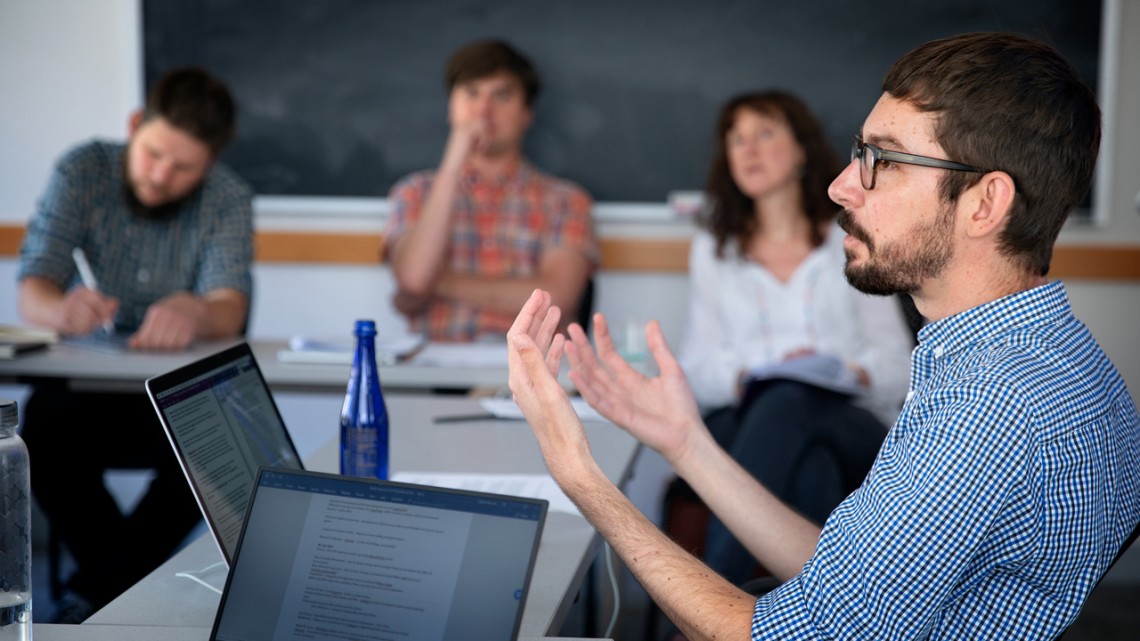
Faculty and postdoctoral fellows investigate the relationship that ties literary criticism to media studies within the field of German Studies during a seminar in Klarman Hall.
Seminar participants explore literary and media theory
By Linda B. Glaser
Students in a light-filled classroom in Klarman Hall don’t seem to notice the verdant courtyard just outside the window, so focused are they on exploring the ties between literary criticism and media studies. They’re participants in the six-week DAAD Faculty Summer Seminar for North American faculty and postdoctoral fellows in the humanities and social sciences.
The “Literature-Media-Form” seminar examines topics in the interdisciplinary field of German studies from historical and theoretical perspectives. Drawing on contemporary approaches to media theory and media and literary studies, the course provides a cross-disciplinary framework for examining the evolving relation between literary practices, technological developments and conceptions of media.
“The seminar showcases the college’s commitment to fostering a vibrant intellectual exchange in the humanities also in the summer months, a time when most university campuses go dormant,” said course instructor Patrizia C. McBride, professor of German studies and director of the Institute for German Cultural Studies.
Seminar participants cited the opportunity to be surrounded by intellectually stimulating colleagues as a motivation to participate. “Being the only German [studies] person at a liberal arts college, you don’t get to have those conversations at all, and even at a big university you don’t have many opportunities,” said Bryan Klausmeyer, an assistant professor at Virginia Tech.
And while Katrina Nousek, M.A. ’10, Ph.D. ’15, visiting assistant professor at the University of Richmond, enrolled in the course because of her academic interests in visual culture and media studies, access to the Cornell University Library was also a big draw.
The first four weeks of the course focused on seminar-style discussions of readings McBride selected. For the final two weeks, participants are offering public workshops and lectures.
On July 18, Erik Born, a Mellon postdoctoral fellow at the Society for the Humanities and visiting assistant professor of German studies, gave the first workshop on his paper, “The Poetry of Slow Motion: Cinematic Technique and Literary Form in the Weimar Republic.”
Slow motion cinematography, he explained in his summary, was believed to reveal “otherwise imperceptible natural processes beyond the threshold of unmediated vision ... To many observers in the Weimar Republic, moreover, the promise of slow motion consisted not only in decelerating the fast-paced rhythms of modernity, but also in accelerating aesthetic production by disclosing entirely new forms of movement.”
The workshop discussion raised questions such as why particular aesthetic forms emerge at a given time and why historical examples still move us.
Following Born’s workshop, Carl Gelderloos from Binghamton University led a discussion of his paper “Embodiment, Perception, and Becoming in Paul Scheerbart’s ‘Lesabéndio.’”
The seminar is made possible by funding from the College of Arts and Sciences and the DAAD (German Academic Exchange Service).
The following workshop-style talks are open to the public and will be held in Klarman Hall, Room 155 (workshop papers are available from McBride):
- July 25, 2 p.m.: Josh Alvizu (Roanoke College): “On Isotropic Writing.”
- July 25, 3 p.m.: Felix Tweraser (University of West Georgia): “Otto Preminger, Soft Power Strategies and European Integration in the Cold War.”
Linda B. Glaser is a writer for the College of Arts and Sciences.
Media Contact
Get Cornell news delivered right to your inbox.
Subscribe
